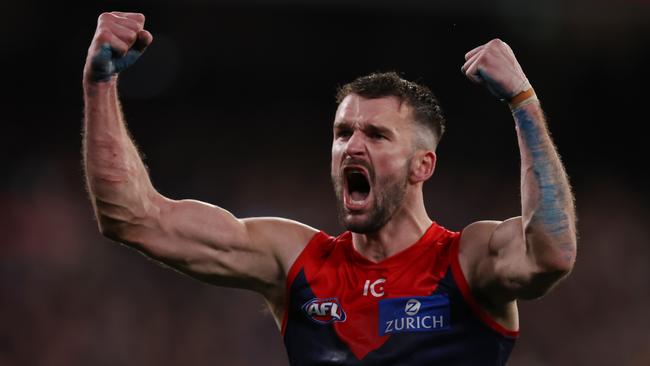AFL drug bombshell: Player from Melbourne Demons returns positive test
The AFL has been rocked after Melbourne player Joel Smith returned a positive drug test. Mark Robinson has the exclusive details.

Melbourne’s Joel Smith has tested positive to drugs late in the home and away season.
A urine sample taken from Smith after a game in the weeks leading up to the AFL finals returned positive for a banned substance, believed to be cocaine.
Smith, who has been provisionally suspended, tested positive after the round 23 game against Hawthorn.
He was tested after the game by Sports Integrity Australia officials as part of regulation in-competition testing for performance enhancing drugs.
He was told about his positive test last week and the AFL was made aware at the same time.

It’s believed Sports Integrity Australia has informed the player he has returned a positive test.
The AFL complies with WADA’s anti-doping code, which is governed in Australia by SIA, and cocaine is listed on the WADA in-competition prohibited list of stimulants.
The AFL said in a statement: “The AFL confirms that a mandatory provisional suspension (which is effective immediately) has been imposed on Melbourne FC player Joel Smith following notification to him by Sport Integrity Australia of an Adverse Analytical Finding (AAF) and a potential violation of the Australian Football Anti-Doping Code (Code).
“It is asserted that a sample provided by Smith during an In-Competition doping control test on 20 August 2023 returned an AAF for the presence of Cocaine and its metabolite Benzoylecgonine being a Prohibited Substance under the Code.
“Smith was tested after the round 23 Melbourne vs Hawthorn game on Sunday August 20, 2023 and was notified by Sport Integrity Australia last week in relation to the finding.
“The AFL was made aware of the test results at the same time. The matter is now progressing in accordance with the Code, initially involving further investigation by Sport Integrity Australia supported by the AFL. In the interim Smith will not be part of Melbourne’s football program.’’
The penalty for an “in competition” positive test is up to four years’ suspension, although there are provisions for a lesser penalty in some situations.
While a four-year suspension is possible, under the AFL’s anti-doping code, if the player can prove the violation was not intentional or there are other circumstances, the penalty could be reduced to as little as a month.

The code was updated on January 1, 2021, whereby “an athlete who has tested positive to a Substance of Abuse’ in-competition (which includes cocaine), the sanction is only three months if the athlete can prove the substance was used out of competition and was unrelated to sporting performance’’.
AFL rules dictate that the “in-competition” period starts at “11:59pm on the day before a competition in which the athlete is scheduled to participate through the end of such competition and the sample collection process’’.
Also, a suspension could be reduced to one month if the ‘’athlete completes a Substance of Abuse treatment program approved by AFL’’.
In 2019, Collingwood’s Sam Murray argued that he had inadvertently ingested a tiny amount of cocaine before he was given an 18-month suspension.
In 2020, former Gold Coast ruckman Brayden Crossley accepted a 12-month suspension for an unintentional anti-doping violation.
In 2015, then Collingwood players Lachie Keeffe and Josh Thomas accepted two-year bans for testing positive to the drug clenbuterol.
They were tested in February of that year, which was out of competition.
More recently, Willie Rioli, when he was at the Eagles, was suspended for two years after being found guilty of substituting his urine during two anti-doping drugs tests.
Smith forced his way into the Demons side in round 12 against Carlton and played every game for the remainder of the season.
He kicked three goals in Melbourne’ semi-final loss to Carlton.
Smith became a father for the first time in September.



